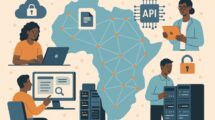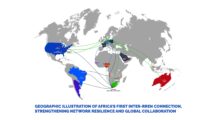Author: Effah Amponsah, WACREN
The research, librarians, and publishing communities in West Africa have been educated on persistent identifiers (PIDs) and their transformational potential in the African scholarly ecosystem.
A workshop organised by WACREN in collaboration with ORCID and Eko-Konnect (an NREN in Nigeria) enlightened participants on how PIDs can enhance the visibility, accessibility, and impact of research outputs, advancing knowledge discovery and scholarly communication globally.
PIDs are unique codes assigned to digital objects, such as research outputs, to ensure long-term accessibility and discoverability. These identifiers remain consistent even if the object’s location or metadata changes. Digital Object Identifiers (DOIs) are PIDs for digital information, while ORCIDs are PIDs for researchers.
At the Workshop, Sefakor Ankora, a DevOps professional at WACREN, presented the Regional RENs’ efforts to deploy the Archival Resource Keys (ARKs), a befitting alternative to DOIs, for its national RENs and their communities due to nuanced local needs.
Sefakor said researchers and publishers will rely on WACREN’s PIDsLink (ARKs platform) for long-term access to their research outputs, including datasets, journal articles and other published materials to enhance discoverability and accessibility.
The benefits of utilising ARKs are manifold. They provide a reliable means of persistently identifying digital resources, ensuring long-term accessibility and citation. Additionally, ARKs facilitate interoperability between different systems and platforms, enabling seamless integration and data exchange. Moreover, the robust resolution services associated with ARKs enhance the user experience by delivering accurate and reliable access to resources, thus fostering trust and confidence in our services.
Participants gained profound insights into ARKs and their pivotal role in ensuring persistent, decentralised, and flexible referencing. Discussions explored various facets of ARKs, including metadata management, identifier minting, resolution mechanisms, and object types.
Lombe Tembo, the Engagement Lead at ORCID, provided invaluable insights into ORCID’s benefits for researchers, emphasising its role in ensuring proper attribution of research outputs.
Eko-Konnect’s CEO, Owen Iyoha, also discussed the seamless integration of PIDs within open access platforms, presenting demonstrations and case studies to provide practical insights. An interactive Q&A session ensued, allowing participants to address specific integration challenges and explore potential solutions.
Attendees engaged in comprehensive discussions addressing technical, administrative, and community challenges while highlighting the benefits of incorporating PIDs into research infrastructure.
PIDsLink is a service supported by the AfricaConnect3 project, co-funded by the European Commission.





